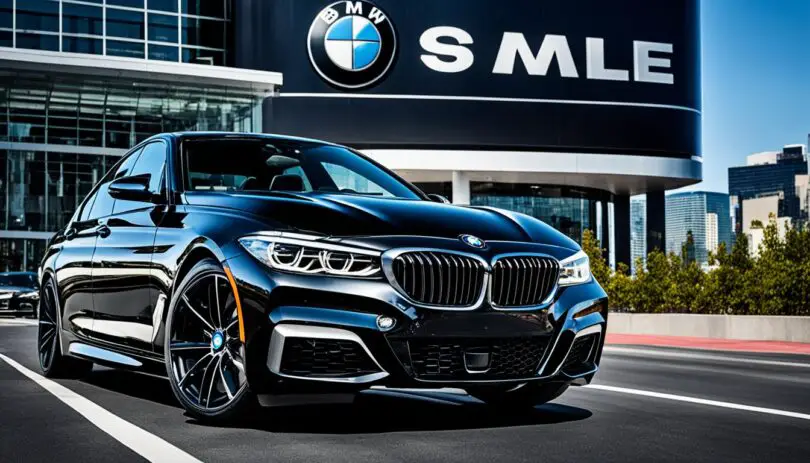Buying a used BMW can be a smart way to get a luxury car without paying top dollar. However, there are certain things to consider when buying a used BMW. Failing to do proper research and understanding the hidden costs of owning a used BMW can lead to unexpected expenses in the long run.
Key Takeaways:
- Buying a used BMW can provide a more affordable option for owning a luxury car.
- Proper research and understanding of the hidden costs are crucial before making a purchase.
- Thorough inspection and test driving are essential to ensure the quality of the used BMW.
- Consider the car’s history, including service records and accidents, before making a decision.
- Knowing common issues with BMWs and their cost of repairs can help in making an informed choice.
When it comes to buying a used car, doing your due diligence is essential. The same goes for a used BMW. In this comprehensive buying guide, I will walk you through everything you need to know when considering a used BMW. From determining if it’s a good car to buy used, to understanding the costs of ownership and potential issues, this guide will equip you with the knowledge to make an informed decision. Let’s dive in!
Is a BMW a Good Car to Buy Used?
Owning a used BMW may require ongoing maintenance and repairs, but it can be a worthwhile investment. BMW cars are renowned for their strong engines and rear-wheel-drive platforms, delivering a thrilling driving experience. Buying a used BMW that is five or six years old can be a smart choice as it helps avoid the immediate depreciation that occurs when purchasing a brand new car.
Benefits of Buying a Used BMW
1. Depreciation
When you buy a brand new car, it starts losing value as soon as you drive it off the dealership lot. By opting for a used BMW, you sidestep the steepest part of the depreciation curve, allowing you to get more value for your money.
2. Price
Used BMWs often come at a significantly lower price compared to their new counterparts. This affordability allows you to own a luxurious car at a more reasonable cost, providing access to premium features and upscale driving experience without breaking the bank.
3. Wide Selection
When you consider purchasing a used BMW, you have a broader range of models, trims, and options to choose from. This variety increases the likelihood of finding a BMW that matches your preferences in terms of features, performance, and style.
4. Proven Reliability
BMW has a solid reputation for engineering high-performance vehicles that stand the test of time. By consulting reputable resources and researching specific models, you can identify BMWs with a history of reliability, helping ensure a smooth ownership experience.
“Buying a used BMW allows you to enjoy the luxury, performance, and prestige of the brand at a more affordable price.”
| Advantages of Buying a Used BMW | Disadvantages of Buying a Used BMW |
|---|---|
| • Avoid immediate depreciation | • Potential for higher maintenance and repair costs |
| • More affordable price compared to new | • Greater likelihood of wear and tear |
| • Wide selection of models and features | • Limited availability of the latest technologies |
| • Proven reliability of certain models | • Potential for higher insurance premiums |
While buying a used BMW comes with its own set of considerations, such as potential maintenance and repair costs, conducting thorough research and following a pre-owned checklist can help identify any common issues or concerns specific to the model you are interested in.
Remember, a well-maintained used BMW can provide years of driving pleasure and prestige at a more accessible price point.
Is It Expensive to Own a BMW?
Owning a BMW can be a costly affair, with various expenses involved such as maintenance, repairs, fuel, and insurance. These costs tend to be higher compared to average automobiles, which can put a strain on your budget. Additionally, BMWs are known to depreciate in value quickly, making them a more expensive vehicle to own in the long run.
However, it’s worth noting that certain older series models of BMWs can offer comparable features and performance at a lower cost. If you’re considering a second-hand BMW purchase, opting for an older model with fewer luxury features might be a more economical choice, as the initial purchase price and depreciation rate may be lower.
BMW Maintenance Advice
“Regular maintenance is crucial to ensure your BMW stays in optimal condition. It’s recommended to follow the manufacturer’s maintenance schedule and carry out inspections and servicing at authorized BMW service centres. This will help identify and address potential issues early on, preventing costly repairs down the line. Additionally, consider investing in a comprehensive warranty or service plan to help manage the cost of maintenance and repairs.”
| Expense | Considerations |
|---|---|
| Maintenance | Regular servicing and inspections at authorized BMW service centres can help prevent major issues |
| Repairs | BMW parts and labour costs may be higher than average, so it’s advisable to budget accordingly |
| Fuel | BMW engines tend to be powerful and may consume more fuel compared to economy cars |
| Insurance | Insuring a luxury car like a BMW can be more expensive due to factors such as higher repair costs and theft risks |
While owning a BMW can come with added expenses, many enthusiasts would argue that the driving experience and premium features justify the investment. Ultimately, it’s important to consider your financial situation and priorities before committing to a BMW purchase, especially when buying a second-hand model. Conducting thorough research, inspecting the vehicle, and seeking professional advice can help you make an informed decision and potentially minimize ownership costs.
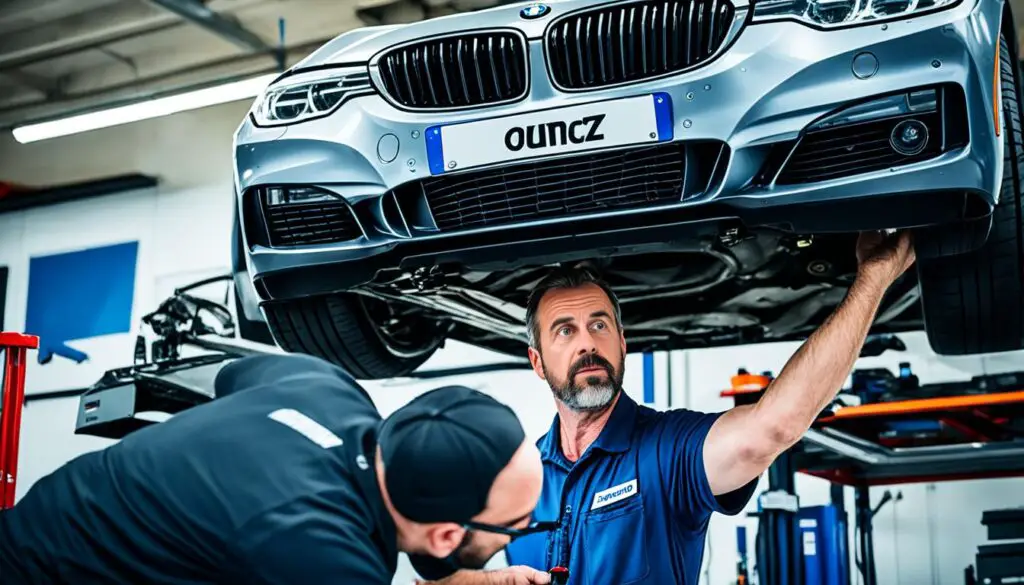
Why Is BMW Resale Value So Low?
When it comes to luxury cars, BMW is a brand that immediately comes to mind. However, despite its popularity and reputation, BMWs tend to have lower resale values compared to economy brands. This is primarily due to factors such as leasing and the perception of higher maintenance costs.
Luxury vehicles, including BMWs, often lose their value faster than more affordable options. The initial high price tag and the continuous influx of new luxury car models contribute to the rapid depreciation of these vehicles. Additionally, leasing is a common practice among luxury car buyers, which floods the market with pre-owned vehicles, further impacting resale values.
One of the misconceptions that affect BMW resale value is the perception of higher maintenance costs. Luxury car owners often assume that the cost of maintaining a BMW is significantly higher than that of economy cars, leading to potential buyers being hesitant to invest. However, with proper maintenance and regular servicing, the cost of ownership can be managed effectively.
Despite these factors, there is a silver lining when it comes to purchasing a used BMW. By buying a pre-owned BMW, you can avoid the initial depreciation that occurs when a brand new car is driven off the lot. Used BMWs offer excellent value for money, allowing you to come closer to breaking even when selling the car in the future.
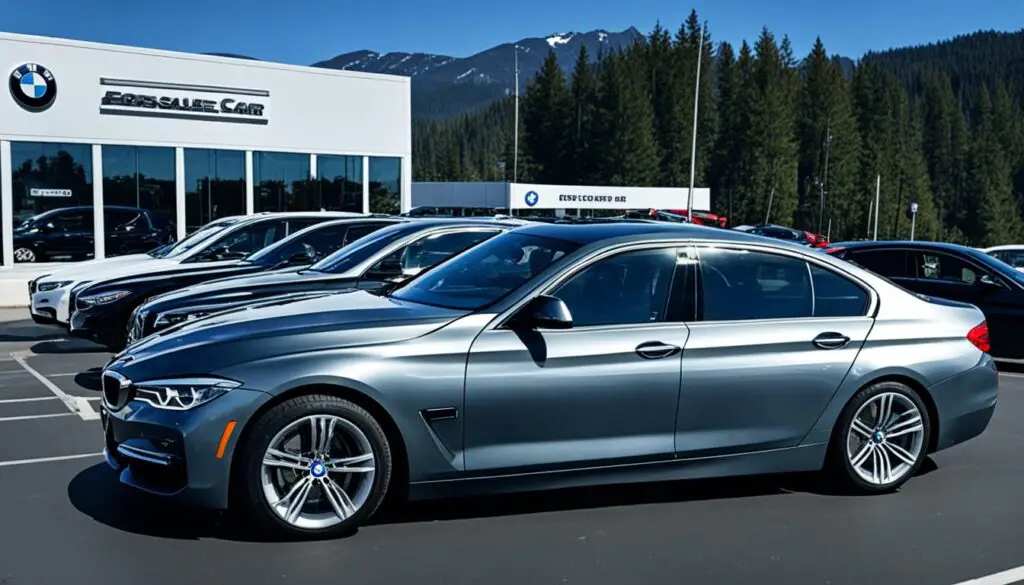
BMW Resale Value Comparison (Example)
| Car Model | Year of Manufacture | Original Price (£) | Resale Value After 3 Years (£) | Depreciation Rate (%) |
|---|---|---|---|---|
| BMW 3 Series | 2018 | £30,000 | £20,000 | 33.3 |
| Audi A4 | 2018 | £31,000 | £21,000 | 32.3 |
| Mercedes-Benz C-Class | 2018 | £32,000 | £22,000 | 31.3 |
“Buying a used BMW allows you to enjoy the luxurious features and performance of a premium car at a more affordable price point. As long as the car is well-maintained and has a clean history, you can expect a satisfying ownership experience while minimizing the impact of depreciation on your finances.” – Car Enthusiast
What You Need to Know Before Buying a BMW
Before purchasing a used BMW, it is crucial to conduct a thorough inspection and consider the car’s history. This includes reviewing the service/repair records, determining the number of previous owners, and examining any accidents it may have been involved in. By gathering this information, you can make an informed decision and avoid potential risks or hidden problems.
During the inspection process, it is important to pay close attention to various components of the car. Start by examining the engine, power steering, transmission, air conditioning, and sound system. These components greatly impact the functionality and overall performance of the vehicle.
Additionally, it is essential to check for signs of water damage, which can lead to costly repairs in the future. Inspect the rims for any cracks or damages, as they can affect the stability and safety of the car. Lastly, thoroughly assess the engine for any visible issues that may require immediate attention.
Inspecting the car thoroughly is critical to finding the right used BMW. By being vigilant and attentive to details, you can avoid unpleasant surprises and ensure a reliable and enjoyable driving experience.
BMW Pre-Owned Checklist:
- Review service/repair records
- Determine the number of previous owners
- Examine any accident history
- Inspect engine, power steering, transmission, air conditioning, and sound system
- Check for water damage
- Assess rims for cracks or damages
- Thoroughly inspect the engine for visible issues
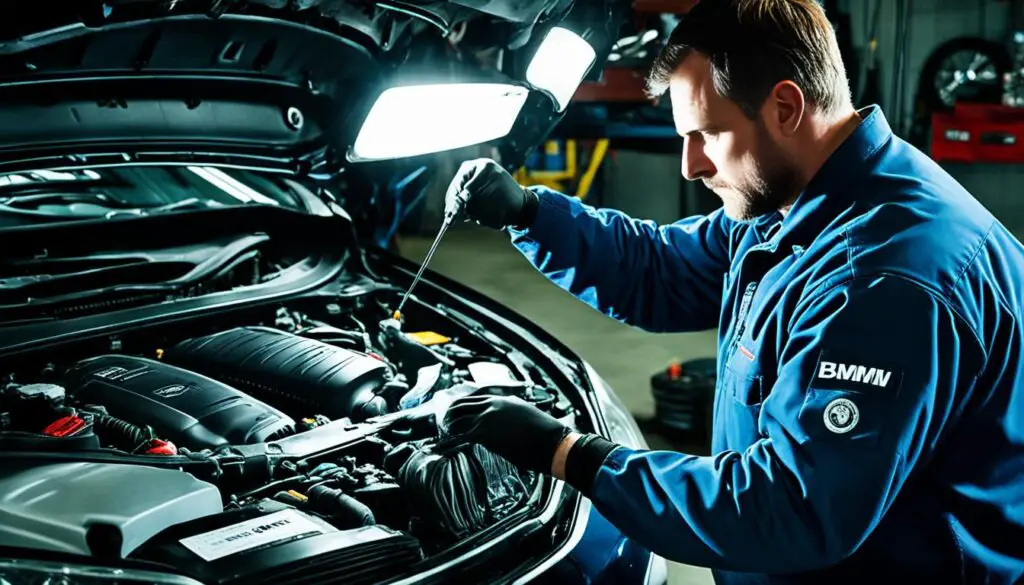
Prioritizing these steps and being meticulous throughout the inspection process will guide you towards making an informed decision. It is crucial to find a BMW that meets your expectations, both in terms of performance and condition.
Common Problems with BMW
When it comes to BMWs, there are a few common issues that owners should be aware of. These problems can affect various areas of the car, including the engine cooling system, crankcase ventilation system (CCV), and electronics.
Engine Cooling System
One of the frequent issues with BMWs is the engine cooling system. This system is responsible for regulating the temperature of the engine and preventing overheating. However, BMWs are prone to water pump failure and coolant leaks. If these problems are not addressed promptly, they can lead to engine damage and costly repairs.
Crankcase Ventilation System (CCV)
The CCV, which is responsible for redirecting harmful gases from the engine, can also be problematic in BMWs. Vacuum leaks and oil leaks can occur within the CCV, leading to engine performance issues and potential oil contamination. Regular inspection and maintenance of the CCV are essential to avoid further complications.
Electronics
BMW cars are known for their advanced features and devices. However, the abundance of electronics in BMWs can also lead to common issues. Problems with the electronic system can range from malfunctioning infotainment systems to faulty sensors and control modules. It is important to perform regular diagnostics and address any electronic issues to maintain optimal performance.
Overall, while BMWs are well-engineered vehicles, it is important to be aware of these common problems and address them promptly to ensure a smooth and enjoyable ownership experience.
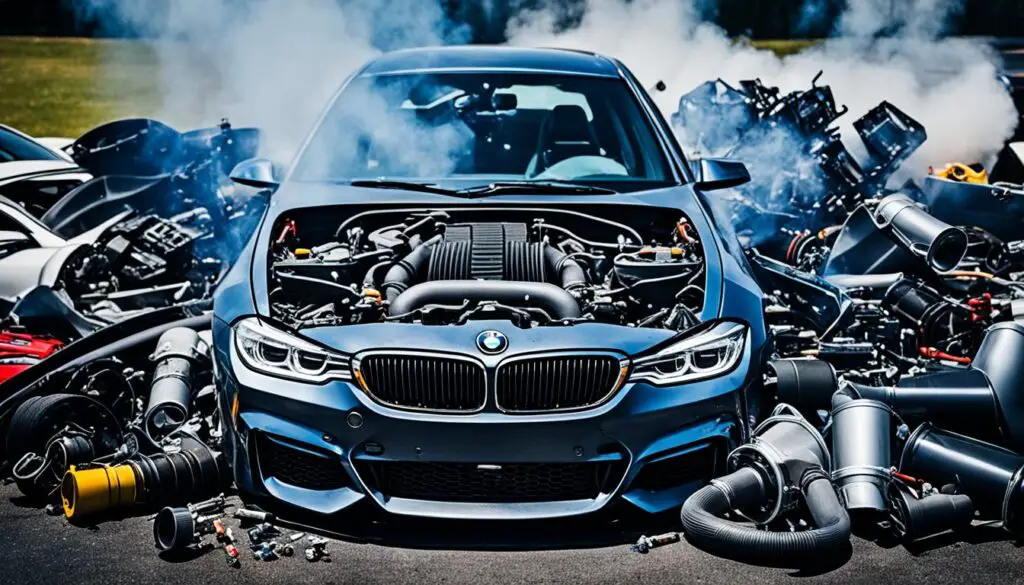
| Common Problems | Impact | Potential Solutions |
|---|---|---|
| Engine cooling system issues | Engine damage, costly repairs | Regular maintenance, prompt repairs |
| CCV problems | Engine performance issues, oil contamination | Regular inspection, maintenance, and repairs |
| Electronic system malfunctions | Loss of functionality, reduced performance | Regular diagnostics, repairs, and updates |
Is a BMW Expensive to Fix?
Regular maintenance is essential for the reliability and safety of any car, including BMWs. However, when it comes to repairs, the cost can vary depending on various factors. These factors include the series model, usage patterns, and road conditions. Being aware of common issues and addressing them early is crucial to prevent more serious problems and higher repair costs.
BMW maintenance advice can help you keep your car in optimal condition and minimize the need for major repairs. Adhering to the manufacturer’s recommended maintenance schedule, such as regular oil changes, filter replacements, and brake inspections, can go a long way in preventing costly issues.
It’s always best to address any noticeable changes or unusual sounds in your BMW promptly. Ignoring warning signs can lead to more severe damage and therefore, higher repair costs.
By staying proactive with maintenance and promptly addressing any issues, you can potentially avoid costly repairs in the future. It’s also worth considering the importance of finding a reputable BMW specialist or dealership that offers competitive pricing for parts and services. Comparing repair quotes from multiple qualified sources can help ensure you’re getting the best value for your money.
BMW Repair Costs Comparison
To give you an idea of the potential repair costs for common BMW models, here’s a comparison table:
| Model | Parts | Labor | Total Cost |
|---|---|---|---|
| BMW 3 Series | £500 | £300 | £800 |
| BMW 5 Series | £700 | £400 | £1,100 |
| BMW X5 | £800 | £500 | £1,300 |
Please note that these costs are estimates and can vary depending on factors such as location, repair shop rates, and the specific issue being addressed. It’s always advisable to consult with a qualified BMW technician for an accurate assessment of repair costs.
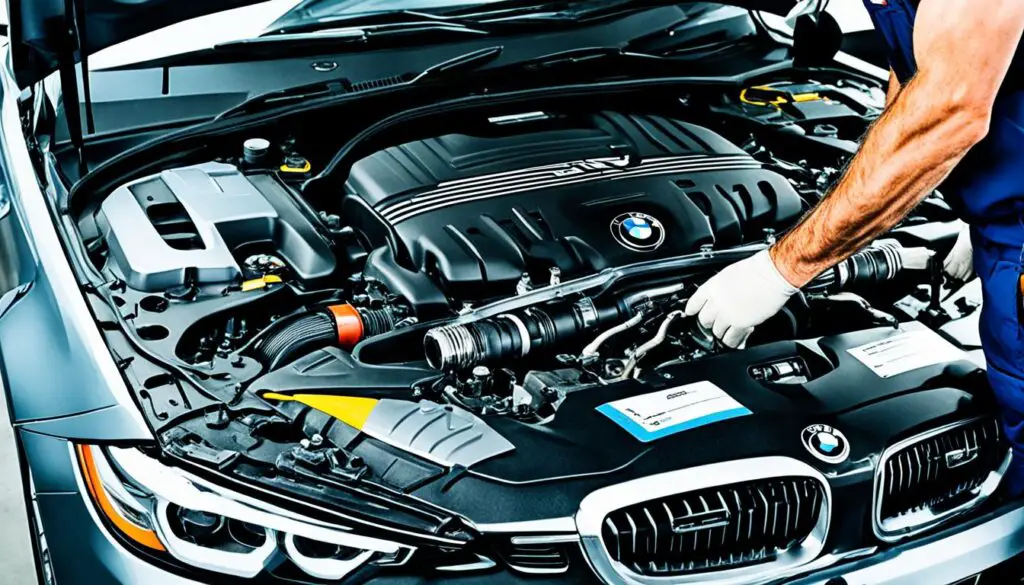
Remember, regular maintenance and addressing issues promptly can help you save on repair costs in the long run. By being proactive and staying informed about BMW maintenance advice, you can enjoy the performance and longevity of your BMW while minimizing repair expenses.
Do BMWs Break Down a Lot?
When considering the reliability of BMW vehicles, it is important to examine both the brand’s reputation and real-world data. According to the 2020 Consumer Reports Car Reliability Survey, BMW has made progress in improving the reliability of its newer models. While it may not be regarded as the most dependable brand on the market, BMWs are still considered to be reliable vehicles.
However, it is crucial to note that the reliability of a used BMW can vary depending on several factors, including the specific model, age, and maintenance history. When purchasing a used BMW, particularly an older model, it is essential to take into account the average levels of reliability associated with that particular model. Conducting thorough research and seeking expert advice can help you make an informed decision.
Consumer Reports Car Reliability Survey
“According to the 2020 Consumer Reports Car Reliability Survey, BMW has improved its reliability with newer models, making them more dependable than before. This demonstrates the brand’s commitment to addressing reliability concerns.”
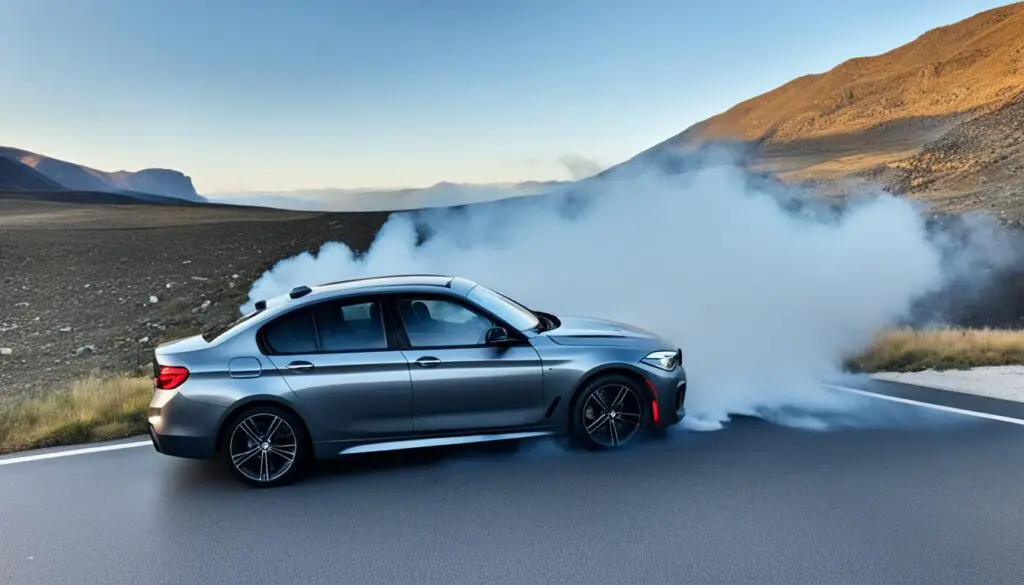
How Many Miles Can a Used BMW Last?
The lifespan of a car can vary depending on various factors. When it comes to used BMWs, the longevity of the vehicle depends on maintenance, usage, and overall care. While parts may gradually weaken and become more brittle over time, proper maintenance can significantly extend the lifespan of any car, including a used BMW.
BMW vehicles are known for their durability and engineering excellence, which can contribute to a longer lifespan compared to some other cars. However, it’s important to note that the specific lifespan of a used BMW is influenced by several key factors.
- Maintenance: Proper and regular maintenance is crucial for keeping a used BMW in good condition and ensuring its longevity. Sticking to the manufacturer’s recommended service schedule, including oil changes, filter replacements, and routine inspections, can help prevent and address any potential issues that may wear down the car over time.
- Usage: The way a car is driven and the conditions it is exposed to can impact its lifespan. Aggressive driving habits, such as constant high-speed driving and abrupt braking, can put more stress on the vehicle’s components, potentially shortening its lifespan. Additionally, extreme temperatures, harsh road conditions, and frequent stop-and-go driving can accelerate wear and tear.
- Overall care: How a used BMW is cared for by its owner also plays a significant role in determining how long it will last. Regular cleaning and waxing can help protect the car’s exterior from environmental damage, while keeping the interior clean and free of debris can prevent premature wear on surfaces and components. Storing the vehicle in a garage or carport can shield it from the elements and contribute to its longevity.
By prioritizing proper maintenance, driving responsibly, and taking good care of a used BMW, owners can maximize its lifespan and continue to enjoy the performance and luxury that BMW vehicles are known for.
| Factors affecting the lifespan of a used BMW | Potential impact on longevity |
|---|---|
| Maintenance | Positive impact – Regular maintenance can extend the lifespan. |
| Usage | Variable impact – Aggressive driving habits and harsh conditions can shorten the lifespan. |
| Overall care | Positive impact – Proper care and storage can contribute to a longer lifespan. |
The Importance of Car History and Warranty
When purchasing a used BMW, it is crucial to have a thorough understanding of the car’s history. Knowing the car’s previous service and repair records, accidents, and ownership details can provide valuable insights into its overall condition and potential future performance. By diligently examining the car’s history, you can make an informed decision and minimize the risks associated with buying a used vehicle.
Furthermore, some BMWs come with dealer-backed warranties, which can significantly reduce the cost of ownership. These warranties provide coverage for repairs and maintenance, ensuring that you are financially protected in case of any unexpected issues. With a warranty in place, you can have peace of mind knowing that potential repair costs are taken care of, allowing you to enjoy the luxury and performance of your BMW without worrying about unforeseen expenses.
Considering the cost of ownership is also vital when buying a used BMW. In addition to the purchase price, it is essential to factor in other expenses such as insurance, fuel efficiency, and expected repair costs. Taking into account these financial aspects will help you make a well-informed decision and ensure that owning a used BMW fits within your budget.
| Benefits of Knowing the Car’s History | Advantages of Dealer-Backed Warranties |
|---|---|
|
|
Undertaking a Detailed Price Survey and Considering Certified Options
When it comes to buying a used BMW, conducting a thorough price survey is essential to ensure you get a great deal. By researching the market price, you can determine a fair value for the specific model you’re interested in. This will give you a strong negotiating position and help you avoid overpaying.
There are several methods you can use to conduct a detailed price survey. Checking classified ads both online and in print can give you a good idea of the average price range for used BMWs in your area. Additionally, visiting agencies that specialize in used cars can provide valuable information on pricing and the current market demand.
“By conducting a thorough price survey, you can ensure that you are paying a fair price for your used BMW and avoid overpaying.”
Another option worth exploring is considering certified pre-owned BMWs from authorized dealerships. Certified pre-owned BMWs undergo a rigorous inspection process and come with a comprehensive warranty, providing you with added peace of mind. These vehicles are typically well-maintained and offer higher reliability compared to regular used cars.
Buying a certified pre-owned BMW also often includes additional perks such as roadside assistance and extended warranty coverage. While the price may be slightly higher, the benefits of purchasing a certified pre-owned BMW can outweigh the additional cost.
When it comes to making a decision between a regular used BMW and a certified pre-owned one, it’s important to consider your budget, preferences, and priorities. Evaluate the condition of the car, its mileage, and service history to gauge its reliability and potential repair costs. Assess your own requirements to determine whether the added benefits of a certified pre-owned vehicle are worth the investment.
Used BMW Price Comparison
| Model | Year | Condition | Price Range (£) |
|---|---|---|---|
| BMW 3 Series | 2015 | Good | £12,000 – £16,000 |
| BMW 5 Series | 2016 | Excellent | £18,000 – £22,000 |
| BMW X5 | 2014 | Very Good | £20,000 – £25,000 |
| BMW 7 Series | 2017 | Like New | £40,000 – £50,000 |
Keep in mind that these prices are approximate and may vary based on factors such as the vehicle’s mileage, overall condition, and the region in which you’re conducting your search. It’s always recommended to negotiate the price and seek professional advice if needed.
By conducting a detailed price survey and considering certified pre-owned options, you can ensure that you’re making an informed decision when purchasing a used BMW. Whether you choose a regular used car or go for the added benefits of a certified pre-owned model, remember to carefully assess the condition, price, and reliability of the vehicle to make a wise investment.
Conclusion
When it comes to purchasing a used BMW, it can be a wise decision for those seeking a luxury car at a more affordable price. However, before making a purchase, thorough research and consideration of important factors are crucial to ensure a satisfying ownership experience.
First and foremost, it is essential to delve into the car’s history, including its service and repair records, accident history, and previous ownership. This information provides valuable insights into the car’s overall condition and potential issues that may arise in the future.
In addition to the car’s history, it’s important to carefully assess the maintenance costs associated with owning a used BMW. While BMWs are known for their performance and luxury features, it’s no secret that maintaining and repairing them can come with a higher price tag. Taking the time to understand the potential costs involved can help you make an informed decision and plan your budget accordingly.
Lastly, conducting a thorough inspection and test driving the used BMW are crucial steps in finding the right car. By closely examining the car’s exterior and interior condition, as well as test driving it for performance and handling, you can gain valuable insights into its overall quality and whether it meets your expectations.
By considering these essential factors, conducting diligent research, and exercising caution, you can navigate the used BMW market confidently and find the perfect luxury car that suits your needs and budget. Remember, with proper care and maintenance, your used BMW can provide you with a rewarding and enjoyable ownership experience for years to come.

